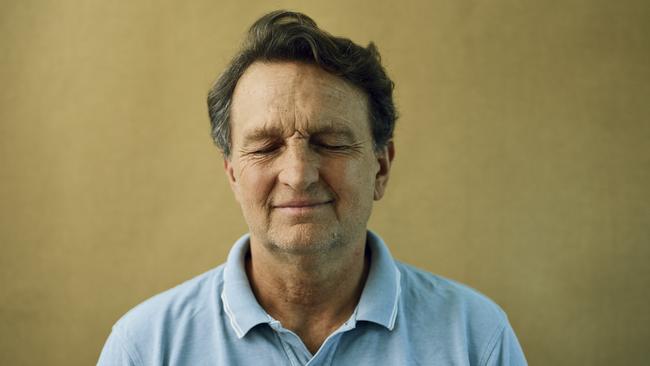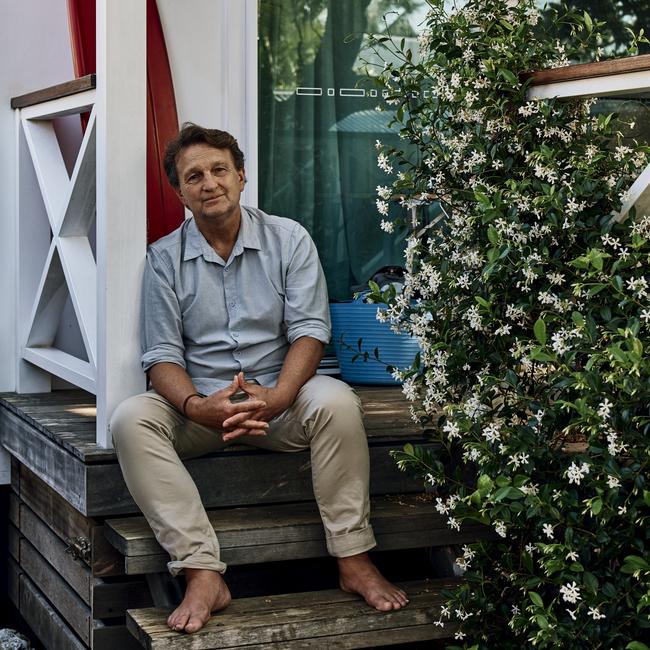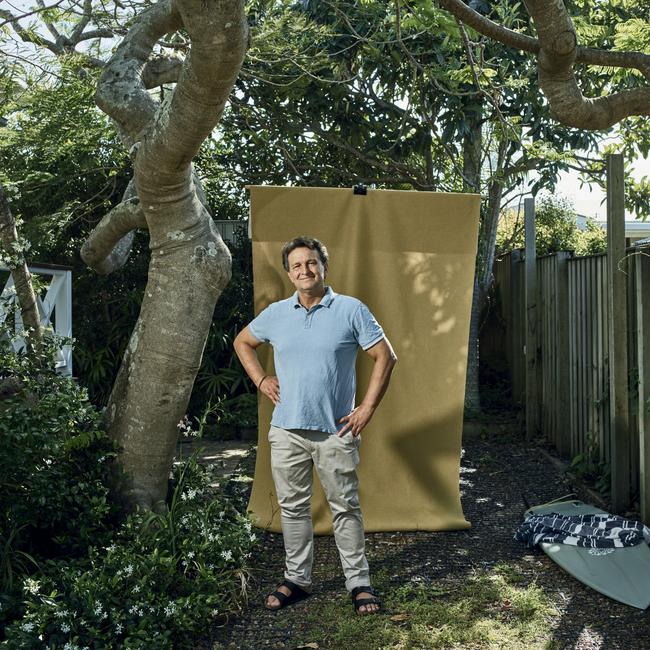Tim Baker on prostate cancer, marriage breakdown and finding love again
I underwent chemical castration as part of my treatment plan. It ended my marriage and left me certain I would live without intimacy, but against the odds I restored my sexuality.

Nine years ago I received a shocking diagnosis of stage four cancer. I wrote a memoir about it, Patting The Shark, published in 2022 – the most vulnerable work I’ve produced in a career spanning 40 years, ten books and literally millions of words. An extract of the book appeared as a cover story in The Weekend Australian Magazine, detailing the many devastating impacts of living with metastatic prostate cancer, particularly hormone therapy (to suppress testosterone, which can fuel prostate cancer progression), bluntly referred to as chemical castration. Under the headline “Farewell old friend”, and with the questionable four-word opener “I miss my cock”, it highlighted the seldom discussed side effects of the frontline treatment for Australia’s most common cancer. The response was overwhelming.
There’s a scene in the animated kids film Madagascar where the escapees from New York City Zoo look like they are about to die a fiery death in a plane crash. As they rapidly spiral to Earth, Melman the giraffe finally confesses to Gloria the hippo, “I love you, Gloria. I always have.” Of course, they don’t die, which makes his declaration … awkward. It was a bit like that with my cancer memoir. I didn’t die and now lots of people know the intimate details of my life. Oops.
I found myself thrust into an accidental patient advocacy role, granted many opportunities to spread the message about lifestyle strategies such as nutrition, exercise and meditation that have helped me maintain good health and quality of life. I’ve spoken at cancer conferences and writers’ festivals, run a patient forum at the Australian Prostate Centre in Melbourne and delivered writing therapy workshops through the Byron Writers Festival. There have been dozens of media interviews for print, radio, TV, online and podcasts.
I recently submitted my creative writing PhD exegesis, Towards A New Language of Cancer (on a scholarship with Griffith University), and was appointed a research fellow for the Monash University Prostate Cancer Research Group, writing a series of articles on their world-leading research. Who knew cancer would prove such a solid career move? And all without indulging in any faux-cancer-survivor silliness, promoting spurious miracle cures.
While I survived stage four cancer, the sad postscript to Patting The Shark is that my 20-year marriage did not. With hindsight, I can see that our relationship was in trouble from the moment I was prescribed hormone therapy, with almost no guidance or support to manage its brutal side effects. Advanced prostate cancer is considered a “couples’ disease” for good reason. The emasculating side effects of hormone therapy, the loss of intimacy, on top of the huge stressors of a cancer diagnosis, opened up a gulf between us we found impossible to bridge.
Reeling from my diagnosis, my instinct was to journey deep within. I immersed myself in a self-care regime that included an hour of meditation morning and night, which meant my wife and I no longer even went to bed or woke up together. And the collapse of my testosterone initially left me unable to regulate my emotions, manifesting in spectacular meltdowns and wild mood swings. Though it did an excellent job of keeping my cancer at bay.
There’s no blame to be apportioned for the breakdown of my marriage, although I’m not sure I would have ended it if she didn’t. If the fault lies anywhere, it’s in a healthcare system that profoundly let us down. Hormone therapy rendered us housemates, co-parents who were more like friends or siblings than husband and wife. We separated only a couple of months before Patting The Shark was published. I recorded the audiobook in a studio in Brisbane only weeks after moving out of the family home. Thankfully, my ex-wife and I remain friends and committed co-parents, and I’m forever grateful that she guided my self-care and assembled an allied health team, which has seen me thrive far longer than predicted.
Although I knew our separation was necessary, I found the end of my marriage devastating, and I assumed I would never re-partner. Who would take this on?

In the aftermath of our separation, I’d anticipated a monk-like existence, practising yoga and meditation, going on retreats, diving deep into my inner world to focus on healing. I even shaved my head. But I would have made a lousy monk. Even without the driver of libido I badly missed female companionship, and when unexpected opportunities arose I discovered I was eager to pursue them despite profound insecurities about what I had to offer. (I’m not sure what it says about the man drought, or the nurturing capacity of women, that a bloke with stage four cancer and erectile dysfunction could be seen as a romantic option. If a woman had written a book like mine, I’m not sure she would have men sliding into her DMs: “Stage four cancer? Asexual? Mood swings? Increased risk of diabetes, cardiovascular disease and depression? You sound nice!”)
After an adulthood of serial monogamy, it was 30 years since I’d last dated or been single for any length of time. An internet meme doing the rounds recently proclaimed, “Married couples, do you look at your single friends dating and feel like you got the last chopper out of ’Nam?” There’s little discussion of dating in one’s fifties – and even less on dating with cancer – in our youth-focused culture. Relationship wisdom is now dispensed by Instagram therapists giving stern pointers to detect “red flags” and “narcissists”. The emphasis is hyper-vigilance to avoid calamity, rather than the anticipation of a joyful union.
I came to understand this was largely because so many women had dating horror stories in the age of dating apps. I vowed I would never go on them. Anyway, what would I put on my profile? “Stage four prostate cancer, PSA 120, Gleason score nine, with lesions in my right femur and left seventh rib. Prognosis five to six years. Early chemotherapy with concurrent hormone therapy, stereotactic radiation and a Trans Urethral Resection of the Prostate to prevent urinary retention.” So hot.
After a couple of early forays, getting hurt, then hurting someone, I vowed to remain resolutely single. My diagnosis and the prospect of a decline in my health at some point was too big a load for any new relationship to bear. The uncertainty. The looming mortality. Relentless rounds of treatments, blood tests, scans, the emasculating impacts of hormone therapy, the roller coaster of existential threat.
I also know the research around the partners of men with prostate cancer – their higher incidence of anxiety and depression, often with little emotional support. I was eager not to be the source of anyone else’s misery.
Then I spotted her through the crowd.
I had turned up alone to the opening night of a regional writers’ festival, still feeling a little emotionally bruised. Strangely, she appeared to be rendered in vivid colour while the throng around her were in black and white. As if feeling my gaze, she turned and looked straight at me. “Hi Tim,” she said, smiling. I had an immediate knowing that we’d met, but had no idea where. Soon, immersed in our own cosy bubble of conversation, we realised we’d both been on the program for a writers’ festival in regional Queensland years earlier. Within 15 minutes of meeting, a photographer approached us and asked to take our photo. We look for all the world like a happy couple in that picture, grinning like Cheshire cats, already leaning into each other.

When the festival opening segued to a film screening, I boldly asked if I could sit next to her. She smiled, offered me popcorn. So much for resolute singledom. When the night ended before we wanted it to, she asked if I’d like to go for a “blockie” – and so we wandered the streets of this quiet country town after dark, exchanging anecdotes from our lives.
I ran into her the next day – we were heading to separate events – and I immediately changed my plans to join her. After the session we got chatting to one of the panellists, who invited us to camp on his rural property, assuming we were a couple. Neither of us corrected him. There was definitely a vibe, but she was entirely upfront about her desire to explore romantic possibilities through friendship first, an enormous relief to me.
The development into something more than friends was incremental. It was a month before we even kissed. “It’s a gateway drug,” she warned.
And it was.
Having my sexuality stripped back to nothing felt like a disability. Its restoration still feels like a miracle. A mutual desire to take things slowly, her optimism that “we will find a way”, has given rise to something new, fresh and entirely thrilling – our own invention. Mind-blowing for a man who had considered himself entirely asexual for the previous seven years. The sensuality of skin-to-skin contact has been a revelation. I wonder if it’s akin to losing one of your physical senses and the others being enhanced to compensate. Her playful sensitivity makes this all a delightful exploration. Together, we’re learning to slow down and build trust and attune to each other’s bodies and nervous systems.
A friend of mine, a champion longboard surfer who was unimpressed by the hyperactive tricks of shortboarders, once told me: “Longboarders make better lovers because they let the wave rub up against them and respond to its cues rather than imposing themselves upon it.” I repeated this line over lunch with my partner and her closest circle of friends in a surprisingly candid conversation about intimacy. One of her girlfriends let out a small moan of approval. I hope her husband took note.
I write about these personal matters, despite some discomfort, because I want other men in my circumstances (and where relevant their partners) to know that mutually fulfilling relationships are still entirely possible. Hormone therapy has been used to treat prostate cancer since the 1940s. Every year, around 25,000 Australian men will receive a diagnosis. And yet there are still no specific guidelines offered to patients to manage the awful side effects of its treatment. And so thousands of men, couples, entire families are impacted by hormone therapy – in broken marriages, sexless relationships and moody, socially isolated men.
I had to come up with my own mantra to manage the side effects – Take Your M.E.D.S. (Meditation, Exercise, Diet, Sleep) – which has been widely endorsed by key prostate cancer physicians like Professor Declan Murphy from the Peter MacCallum Cancer Centre. “We are working with [Tim] on his mission to draw attention to these strategies and improve outcomes for all of our patients,” he has written.
But I am still stunned that now, having outlived my initial prognosis by three years, and experienced the implosion of my decades-long marriage, I have again found companionship and a joyful intimacy. I feel as if I’ve stumbled onto something here that may carry lessons for other men, not just those living with prostate cancer or the ravages of hormone therapy.
“Our conventional, socially conditioned view of sex is linear and one-dimensional, lacking in balance, intelligence and spiritual insight,” writes Diana Richardson in her book Tantric Orgasm For Women. Victoria Cullen, who runs the website A Touchy Subject (which provides resources for men with prostate cancer wanting to resurrect sexual function and intimacy), says my story is not uncommon. The wife of one of her clients sent her an article she’d written entitled “Why men with prostate cancer make better lovers.” The patience, investment in their partner’s pleasure, a non-urgency and a de-centring of male entitlement is apparently refreshingly welcome for many women.

One of the more delightful emails I received after my book was published was from a man in his seventies managing a similar diagnosis and treatment path. “I decided to study how lesbians pleasure each other and have been able to keep my wife very satisfied,” he wrote.
I sometimes wonder, am I a better man with low testosterone? If I was miraculously cured, and my testosterone levels returned to normal, who would I be? I’d have more reliable sexual function, for starters, probably more pronounced musculature, very likely less hair and a worse temper. While it would be nice to have more prominent abs and biceps, I like who I am now and I’m not at all sure I’d want to go back to the old me, even if it was possible.
I was invited to speak at a prostate cancer conference in Cairns last year and attended a session on erectile dysfunction and penile rehab after prostate surgery. The room was full and 90 per cent female, mostly prostate cancer nurses. As we filed out after an illuminating session about the relative merits of vacuum pumps, pills, injections and even surgical implants (two silicone balloons surgically inserted in the shaft of the penis, connected to a small hand pump implanted in the scrotum, if you must know! A bridge too far for me), one of the few other blokes in the audience made eye contact and moved towards me. “What are all these women doing here?” he demanded to know, outraged by this intrusion into secret men’s business. Being angry that women want to help men restore sexual function seemed to me a self-defeating response. I can’t imagine a room full of men educating themselves about female sexual health and pleasure.
It has become clear to me how many women care deeply for the health and wellbeing of men, and how sorely we need more men to not just reciprocate but to practise better self-care. Because where men suffer ill-health, women – wives, girlfriends, daughters, carers – suffer too, carrying the load of caring and supportive roles at the expense of their own lives.
I often sense other people’s sympathy for me. “You poor man.” Or “Thank goodness it isn’t me.” And yet I stand on the other side of a threshold we all must cross eventually, to confront our mortality, the unshakeable reality that we too will die, like all humans who have ever existed. Many times over the past nine years I’ve felt like life has kicked the shit out of me, yet it seems to have deposited me right where I need to be.
I observe a supportive daily circuit. Stretch, check surf, ride waves or swim, prepare healthy food, eat, exercise in some form, write, read, strum guitar. Rinse, repeat. This meditative existence is interspersed with joyous adventures with my partner, between her mountain home and my coastal one, the forest and the beach, indulging in the best of both worlds. I’ve treated my cancer diagnosis as carte blanche to be entirely pleasure-seeking in my lifestyle, while performing just enough (and mainly enjoyable) work duties to pay the bills. I recognise my enormous privilege in all this.
Of course, if I could wish away the cancer I would – but I would not wish away what it has taught me. And the two are inseparable. Maybe I’m becoming an existential longboarder, allowing life to rub up against me and responding to its cues, not imposing myself upon it. Or as meditation teacher and scholar Jon Kabat-Zinn says, “You can’t stop the waves, but you can learn to surf.”
